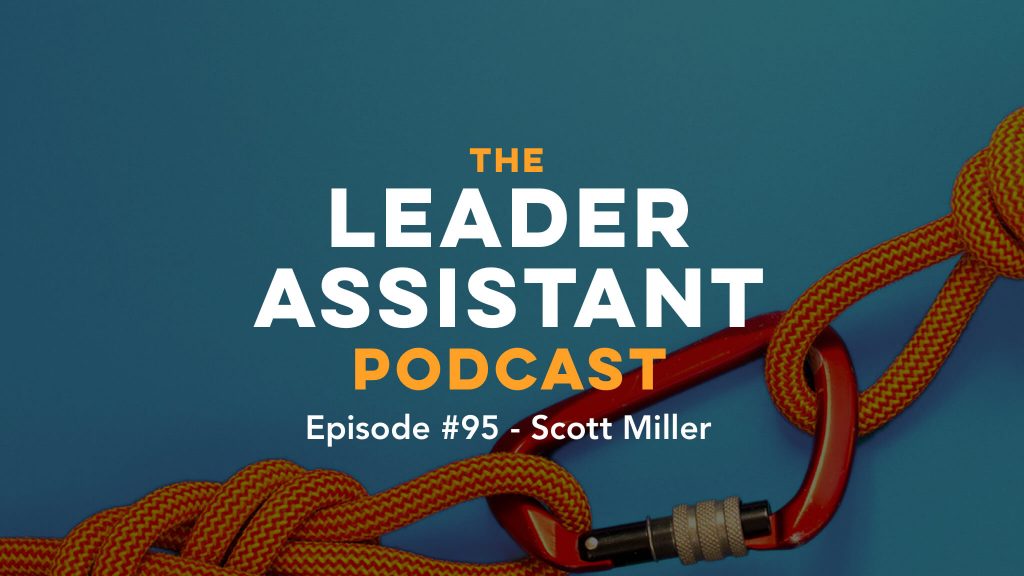Scott Miller is the author of Management Mess to Leadership Success: 30 Challenges to Become the Leader You Would Follow and other bestselling books.
As assistants, we’re great at learning from each other, attending assistant training events, listening to assistant podcasts, etc. But Leader Assistants will read books and listen to podcasts their executive’s listen to, and attend training events that their executive’s attend.
This is why I’m excited to share my conversation with Scott, who is not an assistant – or an administrative professional trainer or speaker. He trains executives all over – helping them be leaders worth following. In fact, your executives have more than likely consumed a resource from Scott or others at Franklin Covey over the years, so listen up for some perspective from the other side of the table.
Scott and I talk about what he looks for in an assistant, what it means to be a leader you would want to follow, how to build confidence, tips for personal branding, what you can do to earn the trust of your executive, and much more.
Note: One of the books Scott refers to in our interview is Range: Why Generalists Triumph in a Specialized World by David Epstein, which I highly recommend you check out.
LEADERSHIP QUOTE
With people, slow is fast, and fast is slow.
– Stephen R. Covey
THE LEADER ASSISTANT BOOK
Download the first 3 chapters of The Leader Assistant: Four Pillars of Game-Changing Assistant for FREE here or buy on Amazon here.
JOIN THE FREE COMMUNITY
Join the Leader Assistant Slack Community here, or the Facebook Group here for bonus content and to network with other assistants who are committed to becoming leaders!
CONNECT WITH SCOTT
- Scott on LinkedIn
- Scott’s book, Management Mess to Leadership Success: 30 Challenges to Become the Leader You Would Follow and book website – managementmess.com
- On Leadership Podcast (hosted by Scott)
ABOUT SCOTT
Scott Miller is a 23-year associate of FranklinCovey and serves as the senior advisor of thought leadership. Scott hosts multiple podcasts including FranklinCovey’s On Leadership and Great Life, Great Career. Additionally, Scott is the author of the multi-week Amazon #1 New Release, Management Mess to Leadership Success: 30 Challenges to Become the Leader You Would Follow. Scott authors a weekly leadership column for Inc.com and is a frequent contributor on podcasts, and webinars. Previously, Scott worked for the Disney Development Company, and grew up in Central Florida. He lives in Salt Lake City, Utah, with his wife and three sons.
SUBSCRIBE
Subscribe to The Leader Assistant Podcast so you don’t miss new episodes!
You can find the show on Apple Podcasts, Spotify, Google Podcasts, Pandora, and Stitcher.
Join my email list here if you want to get an email when a new episode goes live.
LEAVE A REVIEW
If you’re enjoying the podcast, please take 2 minutes to rate and review the show on Apple Podcasts here. Each review helps others find the show, and helps me stay motivated to keep the show going!
—
EPISODE TRANSCRIPT
Scott Miller 0:00
I’m Scott Miller and today’s leadership quote comes from Dr. Stephen R. Covey. With people slow is fast and fast is slow.
Podcast Intro 0:14
The Leader Assistant Podcast exists to encourage and challenge assistants to become confident game changing leader assistance.
Jeremy Burrows 0:24
Thank you so much for listening. Oh, I’m old. Hey, leader assistance. Thanks for tuning in to The Leader Assistant Podcast that your host Jeremy Burrows. I’m super excited today to be speaking with Scott Miller from Franklin Covey. Scott serves as the executive vice president of thought leadership, Scott, how’s it going?
Scott Miller 0:43
Excellent. Jeremy, thank you for the platform today.
Jeremy Burrows 0:46
So tell us a little bit about you. And we’ll start with your very first job. What was your very first job? And what skills in that job? Did you learn? Or did you learn that you still use today?
Scott Miller 0:58
You know, my parents forced me back in elementary school to go walk around the neighborhood. And knock on people’s doors. I didn’t know to get lawn mowing jobs, pulling weeds, washing cars. And I hated it. I hated it. But it taught me a lot about just, you know, being bold and courageous. And being able to create a value proposition. I mean, I didn’t call it that back then. Right. But it took a lot of courage for a skinny kid who was 15 Or not even 15, probably like 10 years old to walk around the neighborhood and knock on widows homes and ask them if I could mow their yard and negotiate a price and things like that. So it taught me perseverance and stamina and courage. And it served me extremely well. It also taught me that my parents because they could didn’t mean they would buy me anything I wanted. I had to earn my own money. And they would match it occasionally for, you know, motor scooters and things like that. But I was taught the value of $1. Very early in life for my parents, I learned just because my parents could buy me something, doesn’t mean they should. And I’ve learned that probably too late in my own parenting but not too late to make sure my kids develop a similar work ethic.
Jeremy Burrows 2:09
Awesome. So give us kind of a quick snapshot of where you went from knocking on neighbors doors to where you are today, in your career.
Scott Miller 2:21
Sure. So after knocking on lots of doors and washing, hundreds of cars and mowing hundreds of lawns, I opened up a little bakery stand at a local farmers market. I then became a waiter in a restaurant I worked a full time bakery delivery job, woke up every morning, started work at five o’clock work till one o’clock and went to college full time after that. So I have worked full time since I was 18 years old, like I haven’t stopped and I’m 51 now so do the math. I then joined a presidential campaign that went on and actually won back in 1988 was on their campaign for two years, I sold real estate. While I was getting my college degree. I joined the Disney company back in 1992. And for four years, I worked in the real estate arm of The Walt Disney Company called the Disney development company in Orlando. And then they invited me to leave, which is a nice way that Disney says they get rid of you and I because I was a jerk and immature and not very self aware. And then I joined the Franklin Covey company where I am today 23 years ago, which of course is the leadership consulting firm founded by Dr. Stephen R. Covey, of course, the seven habits fame, His book has sold 30 million copies in 30 years. I started as a frontline salesperson, I became a sales manager, a general manager, Vice President, eventually became the Chief Marketing Officer for about seven years and a year ago, stepped away from that role and became the Executive Vice President of thought leadership, which allows me to kind of in essence, you know, build up profile of the brand globally with our own thought leadership and then started writing books. I’ve written two best selling books in the last year. One just debuted last week at number three on the Wall Street Journal list. And I’m writing about six more in the next four years. And that kind of sums it up.
Jeremy Burrows 4:10
Wow. So hyper vacation, so you’ve been busy and I even see on your LinkedIn today. You were hanging out with Rachel Hollis.
Scott Miller 4:18
Oh my gosh. Oh, their career highlight? Yeah, I mean, can I tell you? Rachel Hollis has sold 4 million books in the last two years. Her book, girl wash your face was the second highest producing book or highest selling book in 2018. Only after Michelle Obama. She’s the real deal.
Jeremy Burrows 4:38
Wow. That’s crazy. So let’s talk a little bit about your leadership book management mess to leadership success. 30 challenges to become the leader you would follow. Why did you write that book?
Scott Miller 4:55
You know, I wrote that book honestly to some controversy inside the firm because What I realized after you know, a 25 year career in the leadership development industry, that leadership is harder than most people tell you it is it’s unrelenting and can be unrewarding in the short term, and it isn’t for everyone. And so I just wanted to kind of develop a new type of point of view, which is that leadership doesn’t always work out. Well. In fact, it’s been really difficult for me, I’m not sure Jeremy, I ever should have been a leader of people. I think people can have leadership skills in them, lead projects, lead initiatives, lead campaigns. But that doesn’t really mean that everybody should be a leader of people. It creates a requires a very different level of skills than most people have. Most people are promoted to be leaders to be leaders, because they were great individual producers mean, they were the best dental hygienist or the best Digital Designer, the best salesperson, and rarely do those skills that make you the best at anything translate into make you a great leader of people. In fact, it’s actually the opposite skills you need. So I wanted to write a book to dispel some of the myths that leadership is as easy as a lot of the academics including us have written and it did extraordinarily well, because I think there was time was time, for a refreshing voice out there to say leadership is great. But it’s not for everyone. So don’t be lured into leadership come in with your eyes wide open.
Jeremy Burrows 6:27
So what are one or two characteristics of a leader you would follow?
Scott Miller 6:33
Well, I think one is that too often leaders think they have to be the smartest person in the room. And it’s just not true. To quote my dear friend, Liz Wiseman, who wrote an extraordinary leadership book called multipliers, a leaders job is not to be the genius, but rather the genius maker. So I want to work for a leader that doesn’t try to be the smartest person in the room that has the maturity, the patience, the countenance, if you will, to hold back and let other people feel smart, let other ideas bubble up. And not be so distant from me, I want to be able to relate to my leader, and be able to share my own insecurities, my own vulnerabilities have a real conversation to admit, I’m a mess sometimes, and not everything is perfect. I want to work for a leader who admits their own messes, doesn’t wallow in them or, you know, defend them just says, Hey, this is a mess for me, too. So first is someone I can relate to. Second is someone who has your back that you know, calls out your blind spots, ideally in private, but has the courage, the consideration to actually be a coach and a mentor and share with me what are things that I’m doing wrong, that are tripping me up? Are there things that I’m doing for sure, that are injuring my own brand? Match and having a leader that has your back has the courage to tell you in a high, high trust way, the things you’re doing wrong, at the same time lifts you up and you feel better around them? And don’t always feel like it’s you can’t have a decent idea? Because they’re always the smartest person in the meeting.
Jeremy Burrows 8:09
So, yeah, that’s great. So you mentioned confidence, how can we grow in our confidence? It’s kind of in the middle of the mess.
Scott Miller 8:19
You know, I interviewed a gentleman Jeremy named David Epstein. About a month ago on the podcast that I host for Franklin Covey called on leadership, it’s now the world’s largest leadership newsletter and podcast. It David Epstein wrote a book recently called Oh, the name is the name is. I’m embarrassed, the name is escaping me right now. It’ll come to me. But he wrote this book, where he basically dispels a lot of the research that Malcolm Gladwell was, you know, did around the 10,000 hour rule. And in that you have to have, you know, expertise in a particular area, the books called a range ra n. G. And David talks about how generalists are really the experts of the future. And so for me, I think confidence comes in having a broad skill set. I mean, I think in my 20s and 30s. Jeremy, I was really paranoid that I wasn’t an engineer. I wasn’t a doctor or a lawyer or a dentist or a digital designer or a black belt. salesforce.com Ninja, right. I was, you know, a little bit sales a little bit, writing a little bit speaking, a little bit project management, a little bit marketing, little SEO, and I really became to grow into my 50s to realize, Wow, all those skills are now coming to bear. You know, once you’re a Salesforce ninja, you’re probably always a Salesforce ninja. Once you’re an SEO expert, you’re probably always an expert, SEO expert, and we need those. Those are great careers, but my paranoia has turned into confidence. Now my confidence is enormous because all of these generalist skills that I’d toiled over for 30 years are really kind of coming to bear as a chief marketing officer, as An executive vice president, as an author, and a speaker, and a keynote and a podcaster, and a radio host. So I think confidence really comes in paying your dues, learning as much as you can from as many different people as possible. Being humble, you can still be confident and be humble, arrogant people can’t be humble. But I really think this book that David Epstein wrote called range, really shed some light on the value of being a generalist, it doesn’t mean you shouldn’t be a specialist. But it really I think, helps to build some confidence. And those of us who didn’t go to law school, who didn’t become an orthopedic surgeon, or an anesthesiologist or a blackbelt, lean manufacturing expert, right, that has built some confidence in me, that it’s all kind of coming together. And a lot of wisdom that I wasn’t quite sure would be useful. But increasingly, I’m confident in this, the broad skills that I’ve learned, so I share that to be less about me, and really more about other people to say, Hey, I think being a generalist is just as valuable as being a specialist, it may just pay off further down the road for you.
Jeremy Burrows 11:08
You know, that’s a really good segue into talking about assistants, because, you know, assistants are some of the best generalists in the world where they are able to figure something out no matter what it is, if it’s an SEO problem, if it’s a graphic design problem, if it’s a business problem, they can figure that out. So tell tell us a little bit about your experience with assistants over your career and maybe what do you look for in an assistant?
Scott Miller 11:36
Yeah, I have been blessed and privileged and honored to have earned the stature and organization to have had as an assistant now for, gosh, probably 15 years, I think I look for different competencies. When I’m in a different role, what I needed as a sales manager and assistant was different than what I needed. As a general manager. And it was different from what I needed. As a chief marketing officer, what I need now is very different. So I think I look for matching tasks to talent. And I needed different things. What was unique about each of those roles was probably not replicable. Each person’s talent. What was similar, are some traits that are mentioned right now, which are, I think, anticipation, if you had to say, what is the number one skill and executive needs and an executive assistant? Is anticipation, looking around corners? Always being an hour? A day, a week, a month ahead of me? And always looking for what am I going to need next? Honestly, in a lot of ways being smarter than me, in terms of anticipating, you know, what is Scott gonna need for my meeting with the CFO tomorrow, discuss the budget? What am I going to need? When I interview a member of the board of directors from our company for a podcast next week? Am I going to need to read her book? Am I gonna need to set up a conference call to discuss question but always being ahead of me, looking ahead of my schedule, I think it’s super important to anticipate what your boss’s needs before she even realizes them herself. The next thing, I think, which is so important, again, a ubiquitous skill for executive assistants, is balancing, checking off tasks for completion with checking off tasks for outcomes. And here’s what I mean. I’ve had too many assistant systems, where I might say, I want you to go set up that buffet, we have clients coming in, go get some Diet Coke, and the assistant will go buy a six pack a Diet Coke and put it on the table. That’s checking it off for completion. Yes, you actually did. What I asked you to do. The great executive assistant is person that goes out and buys Diet Coke, Coke Zero, Diet Pepsi, Pepsi, zero, if it if it exists, unpack it from the case, set it all out with some cups and some ice and decides to go buy, you know, some popcorn to boot to boot. Right? You get the point, right is the difference between just checking off the task. So you can say you did it and kind of bringing your own level appropriately, of creativity to it. So I walk in the room. And I say, Wow, that was so great of you, you really care. You care enough to put a little bit of resourcefulness into it and bring your own sort of ingenuity. You didn’t go spend $50 You spent $15. But you put out a bowl with some popcorn, and some napkins and you kind of thought through it. To me, that is an amazing assistant, someone who cares about the outcome, not just cares to complete the task that you described. That’s such a valuable skill.
Jeremy Burrows 14:48
Yeah, that’s great. Great, great way to put it. So let’s talk practically for a minute Do you let do you have your assistant handle your email and kind of manage your email email inbox and maybe even reply as you, you know,
Scott Miller 15:03
I do some weeding my assistant has full transparency to my email, if there are things that are marked confidential from the CFO or the CEO or the board member that aren’t appropriate for her to look at, we have an agreement, she doesn’t look at them unless I give her permission to. So she has full transparency to all my credit cards, my bank account to, you know, teachers emailing me about, you know, my three boys discipline issues at school, I trust her implicitly, because she’s a lockbox. She does not ever ghost or masquerade as me under any conditions. She doesn’t reply to my emails me, she might occasionally internally say, Hey, Tim, I’ll make sure Scott sees your email. He’s in Europe right now. Give me a couple of days to find a time to have him answer your question. So internally, she might, but she would always declare that it’s her speaking on my behalf, she would never masquerade as me, I don’t think it’s a bad thing. I just don’t choose to do that. Because I don’t want you know, as an officer of the firm, I am legally responsible for what I write what I say what I do. I take that very seriously. So there’s some cases where she might reply for me, disclosing that it’s her, but never outside of the firm only with some inside, inside colleagues.
Jeremy Burrows 16:24
So do you have tips for maybe executives who struggle to give up control their inbox, or even other tasks and then just kind of maybe they’re micromanaging? Or maybe they just don’t feel like it’s more work to, you know, Delegate than it is to just do it themselves?
Scott Miller 16:42
You know, Jerry, Jeremy, every culture is different, right? It’s different than a not for profit than it isn’t a for profit, public versus private government versus quasi government. So I think every executive has to decide how they want to handle their inbox that there’s no one rule for that, you know, some people have very sensitive proprietary roles, and others don’t. So that’s to the each person. I think when it comes to delegating tasks, I advise an executive to really understand why have you hired an executive assistant? Is it to manage your travel and your schedule? Fine? Is it to manage your inbox and an information overload? Is it to file information and be able to retrieve it on a moment’s notice? Is it to actually make your personal life a little easier? Like I don’t have a problem with asking my assistant to pick up my dry cleaning, or to have my car detailed? As long as it is in service to the organization? I never have my assistant do personal tasks for me. Unless it’s, you know, can you help my kids with their Halloween costume because I have to go now attend a three hour meeting from five to 8pm. So there are some occasions where I’ve had my assistant do personal things for me. But it’s always because it allows me to add more value to the organization. To answer your question around delegation. I think different executives have different comfort levels, with, you know, empowerment with your with your administrative assistant. I think it all depends on how much you trust them. Have they proven that they’ve earned a higher level of empowerment. And I think the best thing to do is sit down and have a transparent, high courage, but also high, considerate conversation to say, you know, I’d like for the first four months for us to have you earn your way in to me being comfortable delegating more things to you, and just be very transparent about it. Say, I’d like you for the first few months to, you know, not open my emails, if I’ve opened them, you’re welcome to file them. You’re welcome to turn them into tasks, you’re welcome to turn them into appointments. And then once that goes well, and I really think that we’re in sync and you understand and what my priorities are or what my deliverables are, we’ll move to the next level. If an administrative assistants having difficulty earning that trust from your boss, I’d say sit down and talk to him. Have the have the courageous conversation, because your leader is only going to trust you as much as you earn it. And maybe you’ve felt like you’ve earned it. Think tell them that say, Hey, what does it take for me to earn a higher level of delegation from you? Are there some things that I’ve gotten wrong? Are there some things you’d like me to improve on? Are my is my correspondence, not the level or sophistication you need to be? Don’t guess, don’t assume, show the courage to walk in and say I want to earn your trust? Are there some things that I’m not doing that are preventing you from delegating more to me? Or is something else going on? Because you know what, there are just some leaders who are micromanagers which by the way, I don’t think is always a bad thing. You know, some people’s micromanagement is simply just managing their brand very carefully, or managing the quality level. I don’t think micromanagement is always a bad thing. But when you can discuss it openly in a trade as parent way with no feelings being hurt, then the assistant can decide, is this the right career for me, right? Do I just want to be getting, you know, lunch and booking travel? Because that may be all some bosses want, but go into it eyes wide open on both sides. So it was a long diatribe. But I think there’s some value in there.
Jeremy Burrows 20:19
Oh, yeah, that’s very helpful. So what do you think if you had to kind of put it into one or two sentences? For the assistants listening right now? What makes an assistant a leader?
Scott Miller 20:35
Well, I think you know, it depends. It depends on how you how you define the word leader, right? Most assistants aren’t leader of Pete, leader of people, unless they’re like, you know, the assistant to the CEO. And then sometimes that assistant has, you know, indirect or direct responsibility for the other executive suite assistants. So let’s put aside for a moment that most executive assistant are not, in fact, leaders of people. Let’s define what a leader is. A leader is someone who sets a vision, who is disciplined, who’s focused, who isn’t always an urgent mode, but can differentiate between what is important in what is urgent, that can protect their boss from urgencies that is trustworthy, that delivers on what they say they’re going to do, that they under promise and over deliver, that they have transparent communication skills, that they’re open to feedback, that don’t take things personally, that they can sit down and have a transparent conversation, that they in fact, can be vulnerable, that they can lead a conversation with their boss, you know, their boss may be really, really busy, doesn’t have time to give them all the feedback that they wish they could, so that they lead the conversation. Hey, Boss, can I bring in lunch next week for you? And I can we spend just 20 minutes kind of on a T chart? Could you just share all the things that I’m doing that you’re pleased with? And could you also share some things that I’m doing, that I’m not doing at the level you want. And if you were to share some more detail or more standards, I could be better at rising to that occasion. And I can take it boss. So bring some specifics, I really want to understand how I can be in the same boat rowing in the same direction as you and I can think of an endless ways that assistance can lead out and lead up. I mean, at some point, a lot of executive assistants, you know, mine, in particular, my executive assistant, make sure that I am always in good standing with the CEO and the CFO. And I have a separate assistant that helps to manage my travel, my expenses, my speaking engagements, my podcast, my radio program, and the executive assistant, Trump’s my other assistant, because she makes sure that I am on time and prepared for all of my executive level responsibilities. So she’s always kind of out in front of me making sure I have the reports, I have the numbers that might that my my skeleton doesn’t backup that I’ve never laid for the CEO. She kind of basically keeps me employed. Does that make sense? That’s her job is to make sure that I don’t get crossways with the CEO or the CFO, by the way who both are, you know, I think I’m in good standing with. But she really leads up
Jeremy Burrows 23:12
of great. So what about if you’re, you know, talk, talk to the assistants listening who are not respected? Or maybe not not empowered by their executive? What would you say to encourage them in dealing with a difficult executive?
Scott Miller 23:30
Yeah, I think well, first, obviously go with eyes wide open, right? I mean, ask smart questions. Don’t just take the first job as offered to you go in and say, Hey, I really want to understand what kind of assistant you really need. Because I don’t want to come in thinking one thing. And then you’re not fulfilling that and me getting frustrated. So let’s just be very clear. Am I the right assistant for you? That’s the first thing, right? When’s the best time to plant a tree yesterday, when second best time to plant a tree today. So if you didn’t do that early on, summon the courage. I mean, unemployment at 3.5%, great, trustworthy, executive assistants are in high demand. This is a crucial linchpin role in the C suite of every organization. So go to your boss and say, Hey, I have some questions for you. I really want to grow my skills. I love being an executive assistant. I don’t want to be at a different career. I love this career. But I’m not feeling challenged. I really want to help you. Are there some other areas that if I was to earn your trust, because maybe I haven’t yet that I could actually challenge my own skill set. And I can also allow you to be working on more higher leverage things. Now. The coward executive is going to say no, no, you’re great and it’s me and you’re doing great and I’ll really try harder and they won’t. Well, that’s the case you’re working for the wrong person quit and go work for somebody else. But if as an executive assistant, sometimes you might need to take responsibility for opening up the dialogue, because just because you’re the leader does not mean you possess the maturity, or the self awareness, or the leadership skills or the communication skills to have these types of high courage conversations, you might have to lead up and say to the boss, hey, I would love to contribute more. What are some behaviors you need to see in me, so that I can earn your trust to take on bigger responsibilities and don’t take no for an answer. Just because someone is a leader doesn’t mean that they have wisdom. smarts and wisdom are not the same thing. You may have to challenge an uncomfortable dynamic. And if you’ve felt like you’ve challenged it, and the other person isn’t giving you what you need, don’t be afraid to say that to say, You know what, I feel like what you need as an assistant is this, this, this, and this is what I really want to offer. Is this, this, this and this. I’m not sure that matches, right. So let’s just call it out. Let’s find someone for you, that gives you everything you need. And doesn’t want more than that. So that they’re not looking for something more in four months. And let me move on to a new role. I get it, you’ve got bills to pay. You don’t have, you know, a year salary in the bank. So use good judgment for that. I don’t mean to seem arrogant at all. But you know, be maybe be thinking about having that conversation because most executives delivered in a respectful way, where they think your intent is to have their best interest at heart, and yours, that generally will go pretty well. And if it doesn’t, then you will come to the wrong person go find a new job. Yeah, sorry. Sorry. Sorry. My long answers, Jeremy.
Jeremy Burrows 26:46
All right. I agree. I think especially now with the job market, like you said, for trustworthy EA is very high demand jobs. So take your chance now to go work for somebody that respects you. And, and you know, it’s a good partner to work with. And I
Scott Miller 27:02
also think I think cultures are changing, I think, gone are the days hopefully, where executive assistant executives are arrogant and they’re abusing verbally or physically or, you know, in any name, their assistant, I think the me to movement has level set that I think there is a level of transparency and organizations now where leaders need to make sure they understand how they are held accountable for treating everyone, including their executive assistant. I think there are more respectful executives out there than there are disrespectful executives. But cultures aren’t tolerating it. They are not tolerated in our organization. Like everybody, we have a hotline, right. And it’s anonymous, and anybody can discuss anything with the hotline representative. So even as an executive, you’ve not earned the right to, to speak disparagingly, or to compromise someone’s sense of security, or their sense of self esteem or self worth. Now, do executives have a disproportionate level of pressure they do? Does that license bad behavior? Under no conditions? Does a great executive assistant understand that a C level executive or the owner or entrepreneur might have some need for some pre forgiveness if they blew off some steam or said things the wrong way? Or short? Occasionally? Sure. They’re human, right? Not everything goes to HR. That isn’t that does not need to license any bad behavior. But a great executive assistant knows the difference between a bad day the boss is having with someone who is a jerk or a prick.
Jeremy Burrows 28:42
Yeah, so just to kind of wrap things up a little bit, I’d love to have you share your thoughts on you know, your your role is thought leadership. And so it’s kind of an interesting world where people are like, Yeah, you should become a thought leader, you should put yourself out there share your tips and tricks and your wisdom, even as assistants, there are more and more assistants stepping up, thankfully, and sharing their wisdom and thoughts and try to become thought leaders. But then there’s also this kind of balance of being trying not to be too self promotional. And coming across as just Oh, you’re just, you know, selling yourself and just self promoting all the time. So could you kind of give some tips for those of us that are really trying to establish a brand establish some thought leadership, but also be, you know, not be jerks?
Scott Miller 29:37
Do you really want me to speak that through the lens of an executive assistant or just generally how do you balance building your brand without seeming self promotional?
Jeremy Burrows 29:44
I think generally is great because I think yeah, what I try to do with my podcast is I try to I try to help those of you listening, which are primarily assistance, learn things that from the rest of the world, not just specifically for assistance. So yeah,
Scott Miller 30:00
yeah. So let me define what I think thought leadership is I’ve asked this question a lot thought leadership is the new public relations, you know, gone are the days where you have a PETA PR department as just, you know, fielding inbound media inquiries. Those don’t exist anymore. More, you know, newspapers are shutting down and news departments are short staffed. And you know, the days of issuing press releases are far and few between you do them but you know, kind of as a perfunctory task, thought leadership is the new PR, it is the chance to get your expertise, your point of view, your hard earned reps, and experience out there to let people know what it is you’re knowledgeable about, and to hire your wisdom. So I think there’s a broad line, a thick line between self promotion, it being a thought leadership, or thought leader now you can’t anoint yourself a thought leader, right? It’s like calling yourself an expert. Hopefully no one ever does that. You can call someone else an expert, but shouldn’t call yourself an expert. Nor should you probably ever refer to yourself as a thought leader, somebody else decides you are a thought leader, because you have brought to the market, valuable insights on a particular product service, industry, momentum, future trend. So I think it’s, I think it’s fine to be somewhat self promotional. As long as you can kind of step back, you’ve got some good coaches or mentors that you know, call BS on you, right? Are you adding value? Are you just posting pictures of yourself doing stuff? Are you writing something? Are you videotaping yourself sharing insights? Are you adding value to somebody else’s business, to their career to their brand, versus taking selfies of yourself on the last podium or the last stage and I tried to balance that right me today, I was with Rachel Hollis all day was an amazing event. I shared some pictures shortly, I’ll be sharing a link to the podcast, and where she interviewed me for nearly an hour. And that’s I hopefully add some value value to people. I write a lot of blogs, I write an article for LinkedIn. So I think as you’re building your brand, as you’re hopefully earning the right to be called a thought leader. Ask yourself every day am I adding value is somebody benefiting from this? No is benefiting from seeing a picture with me hugging Rachel Hollis. Right, that serves my own ego. But what it does do is tee up the fact that the interview is coming tonight or tomorrow. And I’d like you to watch because I absolutely think you will receive enormous value from listening to Rachel and Scott’s conversation. So just ask yourself, you know, are you in service to others? Are you in service to yourself, I also think you should be very willing to promote yourself, who else is going to so be your own CMO? Just make sure that in the process, you’re adding value insight, improving somebody else’s journey along the way.
Jeremy Burrows 33:01
Love it, Scott. Well, that’s That’s great advice. And I really appreciate you taking time out of your day to share your your wisdom with the assistants listening and executives listening. Where can we find you online? And how can we support what you’re up to?
Scott Miller 33:15
Well, first, Jeremy, kudos to you for having a podcast for what probably is a generally underserved, professional role. I think as executive assistants are the backbone to the C suite and every office under the founders. I think that they probably get the short shrift when it comes to professional development and acknowledgement. So I want to give a kudos to you for dedicating your time and energy to to feed that role, which is so enormously valuable. People can find me kind of everywhere, right? I’m on LinkedIn, I’d love to have you follow me on LinkedIn. You can search for me on Facebook, Instagram, on Twitter, you can visit managementmess.com That’s the website for the first book I wrote management mess to leadership success. You also can find me at Franklincovey.com If you visit Franklin Covey, you can subscribe to my podcast is called on leadership. Every week I interview a different best selling author, a thought leader CEO comes out every Tuesday at an email. It’s complimentary. And I’d love to have your listeners subscribe to on leadership by visiting Franklincovey.com
Jeremy Burrows 34:20
Awesome, Scott. Well, I’ll share all those links in the show notes so people can find them easily. And yeah, thanks again and keep up your great work and we’ll talk to you soon.
Scott Miller 34:29
Jeremy. Thanks for the time, man. Have a great week.
Unknown Speaker 34:40
Please review on Apple podcasts. Please leave you on Apple podcasts. Goburrows.com







